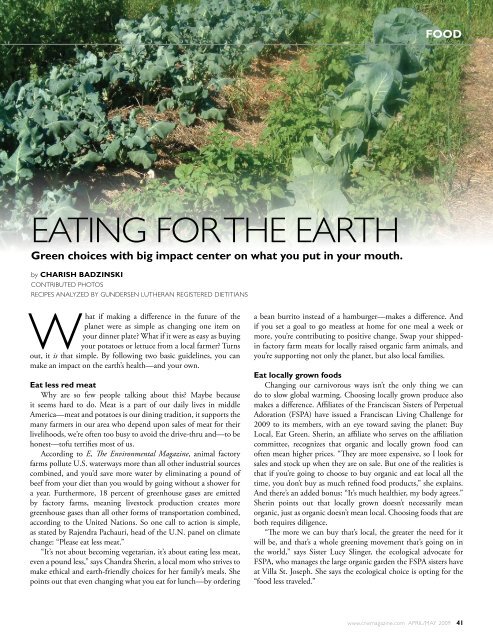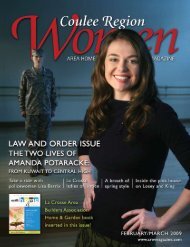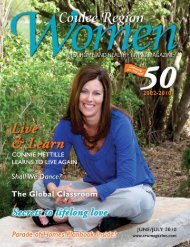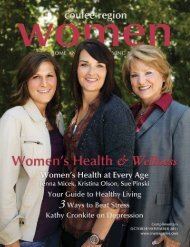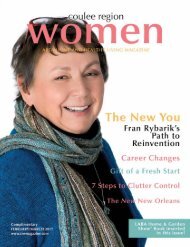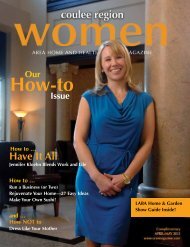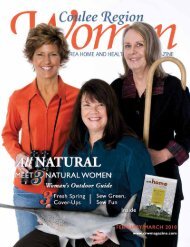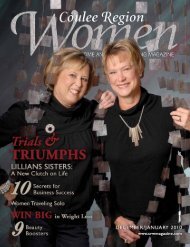A Smile - Coulee Region Women Magazine
A Smile - Coulee Region Women Magazine
A Smile - Coulee Region Women Magazine
You also want an ePaper? Increase the reach of your titles
YUMPU automatically turns print PDFs into web optimized ePapers that Google loves.
EATING FOR THE EARTH<br />
green choices with big impact center on what you put in your mouth.<br />
by CHaRISH BadzINSKI<br />
CONTRIBUTED PHOTOS<br />
RECIPES ANALYzED BY GUNDERSEN LUTHERAN REGISTERED DIETITIANS<br />
What if making a difference in the future of the<br />
planet were as simple as changing one item on<br />
your dinner plate? What if it were as easy as buying<br />
your potatoes or lettuce from a local farmer? Turns<br />
out, it is that simple. By following two basic guidelines, you can<br />
make an impact on the earth’s health—and your own.<br />
Eat less red meat<br />
Why are so few people talking about this? Maybe because<br />
it seems hard to do. Meat is a part of our daily lives in middle<br />
America—meat and potatoes is our dining tradition, it supports the<br />
many farmers in our area who depend upon sales of meat for their<br />
livelihoods, we’re often too busy to avoid the drive-thru and—to be<br />
honest—tofu terrifies most of us.<br />
According to E, The Environmental <strong>Magazine</strong>, animal factory<br />
farms pollute U.S. waterways more than all other industrial sources<br />
combined, and you’d save more water by eliminating a pound of<br />
beef from your diet than you would by going without a shower for<br />
a year. Furthermore, 18 percent of greenhouse gases are emitted<br />
by factory farms, meaning livestock production creates more<br />
greenhouse gases than all other forms of transportation combined,<br />
according to the United Nations. So one call to action is simple,<br />
as stated by Rajendra Pachauri, head of the U.N. panel on climate<br />
change: “Please eat less meat.”<br />
“It’s not about becoming vegetarian, it’s about eating less meat,<br />
even a pound less,” says Chandra Sherin, a local mom who strives to<br />
make ethical and earth-friendly choices for her family’s meals. She<br />
points out that even changing what you eat for lunch—by ordering<br />
FOOd<br />
a bean burrito instead of a hamburger—makes a difference. And<br />
if you set a goal to go meatless at home for one meal a week or<br />
more, you’re contributing to positive change. Swap your shippedin<br />
factory farm meats for locally raised organic farm animals, and<br />
you’re supporting not only the planet, but also local families.<br />
Eat locally grown foods<br />
Changing our carnivorous ways isn’t the only thing we can<br />
do to slow global warming. Choosing locally grown produce also<br />
makes a difference. Affiliates of the Franciscan Sisters of Perpetual<br />
Adoration (FSPA) have issued a Franciscan Living Challenge for<br />
2009 to its members, with an eye toward saving the planet: Buy<br />
Local, Eat Green. Sherin, an affiliate who serves on the affiliation<br />
committee, recognizes that organic and locally grown food can<br />
often mean higher prices. “They are more expensive, so I look for<br />
sales and stock up when they are on sale. But one of the realities is<br />
that if you’re going to choose to buy organic and eat local all the<br />
time, you don’t buy as much refined food products,” she explains.<br />
And there’s an added bonus: “It’s much healthier, my body agrees.”<br />
Sherin points out that locally grown doesn’t necessarily mean<br />
organic, just as organic doesn’t mean local. Choosing foods that are<br />
both requires diligence.<br />
“The more we can buy that’s local, the greater the need for it<br />
will be, and that’s a whole greening movement that’s going on in<br />
the world,” says Sister Lucy Slinger, the ecological advocate for<br />
FSPA, who manages the large organic garden the FSPA sisters have<br />
at Villa St. Joseph. She says the ecological choice is opting for the<br />
“food less traveled.”<br />
www.crwmagazine.com APRIL/MAY 2009 41


